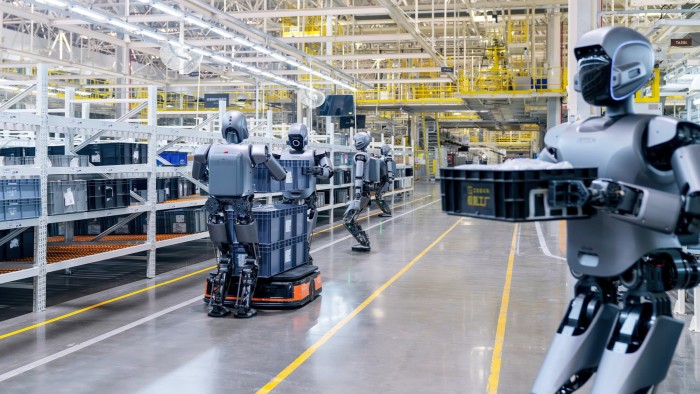Unlock the Editor’s Digest for free
Roula Khalaf, Editor of the FT, selects her favourite stories in this weekly newsletter.
A core tenet of showbiz — and capitalism — is to always leave them wanting more. Tech executives are now promising not just more, but everything.
A rallying cry heard across Silicon Valley is that artificial intelligence will lead to a world of abundance with idealistic executives and engineers hoping that the technology will solve grand problems such as hunger, poverty and disease. The use of abundance, in this context, is reframing current disruption as a delightful destiny.
“The next decade will be about abundant intelligence and abundant energy,” OpenAI chief executive Sam Altman told the US Senate this month. In January, the new dad said he hoped his child’s future would hold “abundance” and “prosperity”, “but you know, generally just a world where people can do more. Be more fulfilled, live a better life.”
This vision also provides a convenient gloss over the short-term harms. Dario Amodei, chief executive of Anthropic, which makes rival chatbot Claude, has urged executives and politicians to stop “sugarcoating”, stressing in an Axios interview the potential for AI to eliminate half of all entry-level white-collar jobs and raise unemployment to 10-20 per cent in the next one to five years.
The concept is not new. Abundance is the title of a 2012 book on the topic by futurists Peter Diamandis and Steven Kotler, written a decade before ChatGPT burst on to the scene. It argues that a range of emerging technologies, including AI, will create a positive future.
Tech executives, as well as venture capitalists Marc Andreessen and Vinod Khosla, are increasingly embracing the term, trying to frame AI as the key to a “post-scarcity” future, where everyone’s lives will be better, we will all have more time, intelligence and energy.
Microsoft chief executive Satya Nadella told Bloomberg last month that he believed AI could deliver more societal benefits than the Industrial Revolution. “When you create abundance,” he said, “then the question is what one does with that abundance to create more surplus.”
His argument is economic: the hundreds of billions of dollars Microsoft spends on AI, he argued, would generate trillions of dollars in economic activity, with data centres leading to more construction, energy consumption and manufacturing.
Demis Hassabis, chief executive of Google’s DeepMind, has argued AI could help develop new energy sources such as nuclear fusion. More broadly, he added: “Suddenly, a lot of those things that underlie the capitalist world don’t really hold anymore . . . Then we should be in this new era economically.”
As a result, he and others argue that a new political philosophy will be required, something New York Times journalist Ezra Klein has explored in his recent bestseller, naturally called Abundance, that argued liberals should embrace innovation and overcome stagnation caused by overregulation.
But even those who push abundance accept that AI might mean our economic systems become unrecognisable. Speaking to then-prime minister Rishi Sunak in 2023, Tesla and xAI chief executive Elon Musk said: “There will come a point where no job is needed.”
He laid that out as a positive scenario, where having a job is a personal choice and we will have “universal high income.” Abundance is “somewhat of the magic genie problem, where if you have a magic genie that can grant all the wishes, usually those stories don’t end well — be careful what you wish for.”
An abundance of time might sound nice, especially with enough resources. However, if one is unemployed and alone, the reality may be more depressing. A World Economic Forum report in April found that 40 per cent of employers expected to reduce their workforce where AI can automate tasks. Although the report also anticipates 11mn jobs will be created as a result of the technology, it will simultaneously displace 9mn current roles.
While we wait for the AI shakeout, we should make sure the vision of abundance is backed by a real plan: training workers, creating economic policies and ensuring a true trickling down of rewards. And if these promises are to be taken seriously, we should all be preparing for a widely different future.
“If things go well, the entire concept of a career will seem as old-fashioned as the concept of being a serf seems to be now,” David Dalrymple, programme director at the UK government’s Advanced Research and Invention Agency, told me. “One should imagine a meaningful and fulfilling life that does not involve what we currently think of as a career.”
